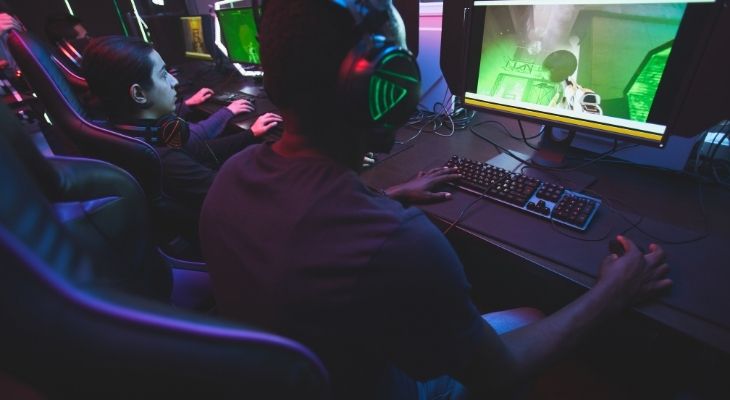The average internet speed in the United States is around 42.86 Mbps, which is more than enough for most people. But what about gamers? If you’re trying to play a game online, are you better off with 150 Mbps or 50 Mbps? This article will answer that question and many others like it, to help you get the best internet speeds on the market today.
150 Mbps is more than enough for gaming. With this kind of speed, you’ll be able to download games quickly, stream live gameplay, and even play VR games without any issues. But two other factors that also affect gaming are latency and ping, and they need to be considered if you intend to enjoy your gaming.
For gamers, latency and lag are two of the frustrating factors that can affect your gameplay. Latency is the delay between when action is taken and when it is reflected on screen, while lag is the general term used to describe a decrease in performance. And both can have a major impact on gameplay, causing missed shots, delayed reactions, and overall frustration.
When you’re gaming or streaming games online, you want to make sure you have the best internet speed possible to avoid any lag or choppiness. The best way to understand how fast your connection is in terms of gaming is to look at your ping (latency) and download/upload speeds. Ping, which is latency expressed as an average of milliseconds (ms), can be crucial when gaming online. The lower your ping, the better chance you have of winning
Is 150 Mbps Internet Fast?
Fast Internet can make all the difference when it comes to your online experience, whether you are browsing the web, streaming movies, or gaming online with your friends.
With a growing base of streaming media, home businesses, and cloud storage services users are clamoring for more bandwidth to get more done. And that’s why high-speed internet has become a primary focus for any provider looking to increase market share and boost revenue.
The answer to whether or not 150 Mbps is fast depends on your needs. Many households have multiple computers, smartphones, and tablets that all need internet access.
A single household can quickly max out a 50–100 Mbps connection if everyone is streaming a movie, doing work from home, and playing games on separate devices at once. If you’re in a household like that, then 150 Mbps probably won’t be enough speed for you.
But if you’re in an apartment building alone or with a few other people who are also trying to use their internet connections simultaneously, then 150 Mbps will be fast enough to do whatever you intend to do with the internet, be it gaming online, streaming, and other online stuffs.
Is 150 Mbps Good Enough for Gaming?
In the modern world of technology, there are so many options available to you in terms of internet connection speeds that it can be difficult to know which would be the best choice for you.
If you’re a gamer and you’re looking to join the next big virtual reality game with your friends, do you need super-fast download speeds? Do you need fast upload speeds? Let’s take a look at 150 Mbps download speeds to see if they are good enough for gaming, or if you should think about getting something faster if possible.
Your internet connection speed can make a big difference in your gaming experience and overall performance, especially if you’re connecting to games that are hosted in the cloud and not on your local computer.
Whether or not 150 Mbps will be good enough for gaming depends on what kind of gamer you are. If you’re an occasional gamer, such as those who play once or twice a week and typically one hour at a time, then a low-end connection speed is probably fine.
But if you’re a hardcore gamer who plays at least four hours each night, then 150+ Mbps is more ideal. Why? Because lag can occur when there isn’t enough bandwidth to handle all of your data traffic. To avoid lag, you need to have enough bandwidth to handle your gaming needs, and that means paying attention to your download speeds (the amount of data transferred from servers) as well as upload speeds (the amount of data transferred from your computer).
The best way to test your current internet speed is by using Ookla’s Speedtest tool. It allows you to run a series of tests and view detailed results about how fast your internet really is. It also gives you information about things like packet loss, which occurs when information sent between two points doesn’t arrive at its destination properly.
Packet loss can also cause serious issues with gaming because it causes delays in response times between players and their devices. Imagine playing Call of Duty online: You might shoot at someone but won’t be able to tell whether they got hit until a few seconds later.
That delay can make gameplay frustrating and unenjoyable, so make sure you get high-quality service from your ISP before signing up for new services. High latency rates, which occur when packets take longer than normal to reach their destinations can also lead to gaming issues.
How Many Mbps Do I Need for Gaming?
If you’re thinking about starting to play an online game, like World of Warcraft or Minecraft, you might wonder what kind of internet speed you need to run it without lag or buffering issues. If this describes you, don’t worry, we have the answer.
With so many different components contributing to lag, it can be difficult to determine exactly how much internet speed you need to game at a competitive level. While there’s no right or wrong answer, it’s important to understand why and how these speeds impact your ability to play games quickly and smoothly.
With that in mind, let’s have a glance at some of these factors, and hopefully help you decide what will work best for your particular situation.

- How many other people are trying to use your connection at once?
- What game are you playing?
- Are you trying to play online or offline games?
- Do you have access to WiFi or wired connections (wired connections provide faster speeds)?
For fast-paced first-person shooter games like Call of Duty or Battlefield 1, it’s recommended that you have an internet speed between 25 and 50Mbps. And if you’re looking to play Massive Multiplayer Online Role-Playing Games (MMORPG) like World of Warcraft or Star Wars: The Old Republic, then you’ll likely need upwards of 100Mbps.
In addition to figuring out how much bandwidth you’ll need for specific activities, you also want to consider other activities that uses the internet as you play your game. If you play video games from multiple devices simultaneously (like watching YouTube videos while someone else plays Minecraft), then getting more bandwidth might be necessary.
On the other hand, if most of your activity takes place from one device at a time, say using Netflix through a streaming device in your living room, then less bandwidth might do just fine.
When it comes down to it, you don’t necessarily need a blazing fast internet connection to enjoy high-quality gaming experiences. Most gamers will find 20-30Mbps to provide them with much speed for their needs; however, if you want to ensure your experience is lag-free, always test your network before purchasing new hardware.
Factors that Affect Internet Speed
A lot of factors can affect how fast your Internet connection speed really is. Here are a few things to take into consideration when assessing how fast your Internet connection can be:
Technology
If you’re using an older modem, upgrading to newer hardware will result in faster Internet speeds. Service providers also offer higher speeds with more advanced hardware, like DOCSIS 3.0 cable modems.
Distance from source
The further away you are from your service provider’s source, or node (usually located at a telephone company office), the slower your Internet connection speed will be. For instance, if you live 10 miles away from a telephone company office and pay for 12 Mbps download speeds, you may only get 8-9 Mbps because of distance and other variables.
Number of users connected
More people using bandwidth on one network slows down that network for everyone else. This is why it’s important to have a router that has enough ports for all of your devices, so you don’t slow down everyone else on your network by hogging all of their bandwidth. Also, remember that every device connecting to Wi-Fi uses up some of its available bandwidth. So if there are five people living in a house using Wi-Fi, each person would ideally have 5 Mbps available to them at any given time, this includes laptops, smartphones, tablets, and smart TVs.
Devices used
Devices for streaming movies and downloading files take up a ton of bandwidth. If you do these activities often, consider getting more than just what’s advertised as high-speed Internet.
File size
The larger the file size, such as streaming video or downloading large files, usually means longer wait times.
Upload vs Download
Uploading data takes longer than downloading data does; therefore upload speeds are typically much slower than download speeds.
Ping Time
Ping time measures how long it takes for your computer to communicate with another computer online. Ping time affects gaming and real-time applications, such as Skype calls or gaming online with friends. Ping time is measured in milliseconds (ms). ping ms = latency + jitter. Latency is the delay between sending a packet of data and receiving an acknowledgment that it was received. Jitter refers to variations in latency, which causes packets to arrive out of order or not at all.
Packet loss
Packet loss occurs when packets are either dropped completely or received damaged during transmission over a network. Packet loss results in poor performance and decreased throughput.
Network congestion
Congestion happens when too many people try to use too much bandwidth at once. It can cause sluggish performance, especially during peak hours.
Wireless interference
Interference happens when two wireless networks broadcast on overlapping channels, causing signals to collide and become unusable by both networks. Wireless interference is common near heavily populated areas where many wireless networks overlap.
Conclusion
Despite what internet marketers may tell you, there is no magic number of megabits per second (Mbps) you need in order to successfully play games online. In fact, when streaming video games and playing multiplayer matches, speed isn’t always as important as stable connections. That said, a faster download speed will help ensure a stable connection, which can ultimately help improve your gaming experience


